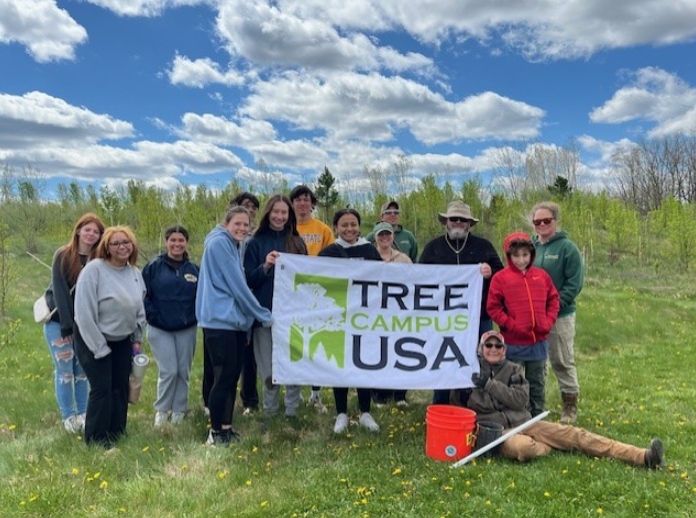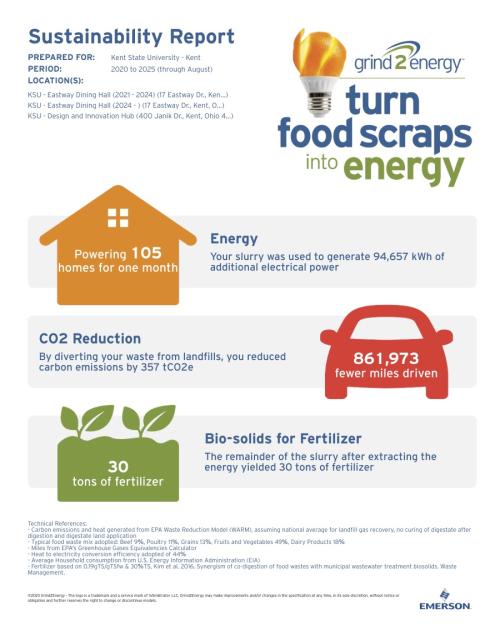Kent State University has earned an AASHE STARS Silver rating for its ongoing commitment to campus sustainability, a step up from the bronze rating on the university's past submission.
“Tłó±đ Office of Sustainability's mission is to grow a sustainable future for all by implementing transformation sustainability processes into the university's facilities, planning process, operations, natural environment and culture,” Leah Graham, sustainability coordinator at Kent State, told Kent State Today.
The Association for the Advancement of Sustainability in Higher Education (AASHE) is a national organization encouraging students and staff at universities to be sustainability leaders, using the Sustainability Tracking, Assessment and Rating System (STARS) to rank sustainability efforts.
With more than 1,200 participants in 52 countries, AASHE’s STARS program is the most widely recognized framework in the world for publicly reporting comprehensive information related to a college or university’s sustainability performance.
"STARS was developed by the campus sustainability community to provide high standards for recognizing campus sustainability efforts,” AASHE Executive Director Meghan Fay Zahniser said in a statement. “Kent State University has demonstrated a substantial commitment to sustainability by achieving a STARS Silver Rating and is to be congratulated for their efforts.”

Sustainability is woven broadly into the curriculum and research at Kent State. Students benefit from a range of sustainability courses, majors, a sustainability minor and many experiential learning and engagement opportunities.
Staying true to its strategic priority of organizational sustainability, the university introduced Grind2Energy, a sustainability solution that converts food waste into renewable energy.
“It is essentially a giant garbage disposal like you would have in your home,” said Jacob Kuehn, senior director of University Culinary Services. “All good scraps produced from the kitchen, such as onion peels, carrot tops and meat trimmings, also post-production waste from consumers, are ground.”
The ground food is held on campus in a holding tank. Once it is filled, the vendor comes to transfer it to a facility, where it's turned into four types of energy: fertilizer, compressed natural gas, electricity and heat.

Two Grind2Energy systems located on campus in the DI Dining and in Eastway Dining Center allow the university to convert 125 tons of inedible food waste into renewable energy every year.

In addition to helping with Grind2Energy, Culinary Services also offers O2Go by Ozzi, providing students, faculty and staff with the option of reusable food containers, reducing contributions to landfills and lowering the carbon impact of campus dining. Kent State received the Ozzi Sustainability award for preventing over 150,000 containers from being sent to the landfill since the program was implemented.
“It saves a lot of paper waste because we’re seeing close to 3,000 to 4,000 exchanges of the Ozzi boxes per month,” Kuehn said.
Culinary Services continues to educate students on their own food waste through the Leadpath program, weighing student food waste to see how much post-consumer waste they are creating and making adjustments accordingly.
“Tłó±đre are two big TV screens by the dish rooms at Eastway and DI, that talk about just strictly post-consumer waste,” Kuehn said. “We’re just asking a couple of questions, so we can be better informed. Ultimately, we are trying to reduce waste.
Robust academic programs, curriculum, campus and public engagement, and Kent State LEED buildings contributed to our STARS standings.
Programs that further helped to boost the AASHE STAR rating are the Office of Sustainability's Campus Race to Zero Waste, Move-Out Program, Bra Recycling Drives and Winter Coat and Clothing Drives. The university celebrates Earth Month and Campus Sustainability Month with large, comprehensive programming.
Since the start of the Bra Recycling Drive, more than 1,000 bras have been collected. Of these, 75% are sent for donations, and 25% for recycling.

“We focus on just reducing waste from being generated in the first place,” Graham said. “We’re avoiding sending items to the landfill, and instead, they get sent for reuse.”
Transportation sustainability is another significant accomplishment for the university. Services like PARTA and SPIN provide accessible and sustainable transportation options for students and staff.
The Office of Sustainability continually partners with regional and local groups and roughly 25 sustainability student organizations exist on campus.
“We have volunteer opportunities where students can get involved with our office,” Graham said. “Professors are consistently reaching out to us, and we work with them and their students on certain projects.”
Graham believes it is good to lead by example regarding sustainability efforts.
“It’s great for us and universities to be leaders in sustainability initiatives and efforts,” Graham said. “We can show how it’s done on our campuses, which is like a little microcosm of a city and how we can implement and expand it into larger-scale efforts.”
Kuehn believes that the ASSHE STAR Silver rating is just the beginning for sustainability on campus.
“Let’s celebrate what we have, further educate people and set goals to be better. Let’s tout it and aim for gold next,” he said.
October is Campus Sustainability Month, and the Office of Sustainability hosts and offers many events for students and staff, such as the National Solar Tour.
“Kent State’s improved STARS rating is a great reflection of everyone’s collective efforts and collaborative spirit in advancing sustainability throughout all areas at Kent State University. We look forward to continuing this journey,” Graham said.
See a complete list of events on the Office of Sustainability website.

